影响世界进程的100位管理大师
著名管理学思想
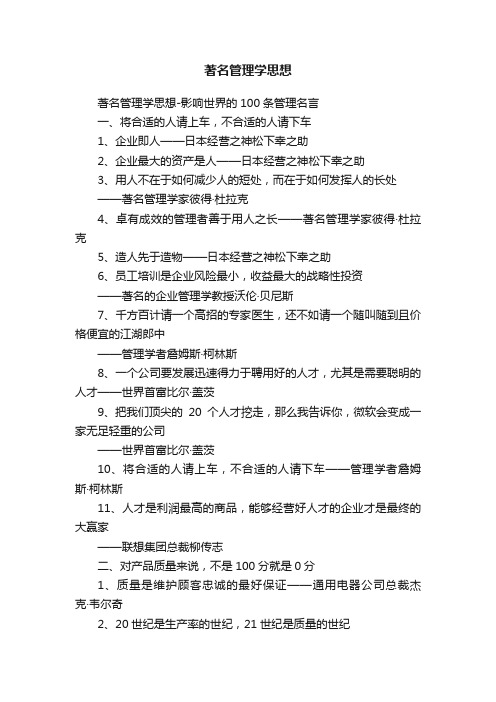
著名管理学思想著名管理学思想-影响世界的100条管理名言一、将合适的人请上车,不合适的人请下车1、企业即人——日本经营之神松下幸之助2、企业最大的资产是人——日本经营之神松下幸之助3、用人不在于如何减少人的短处,而在于如何发挥人的长处——著名管理学家彼得·杜拉克4、卓有成效的管理者善于用人之长——著名管理学家彼得·杜拉克5、造人先于造物——日本经营之神松下幸之助6、员工培训是企业风险最小,收益最大的战略性投资——著名的企业管理学教授沃伦·贝尼斯7、千方百计请一个高招的专家医生,还不如请一个随叫随到且价格便宜的江湖郎中——管理学者詹姆斯·柯林斯8、一个公司要发展迅速得力于聘用好的人才,尤其是需要聪明的人才——世界首富比尔·盖茨9、把我们顶尖的20个人才挖走,那么我告诉你,微软会变成一家无足轻重的公司——世界首富比尔·盖茨10、将合适的人请上车,不合适的人请下车——管理学者詹姆斯·柯林斯11、人才是利润最高的商品,能够经营好人才的企业才是最终的大赢家——联想集团总裁柳传志二、对产品质量来说,不是100分就是0分1、质量是维护顾客忠诚的最好保证——通用电器公司总裁杰克·韦尔奇2、20世纪是生产率的世纪,21世纪是质量的世纪——美国著名质量管理学家约瑟夫·朱兰博士3、对产品质量来说,不是100分就是0分——日本经营之神松下幸之助4、全世界没一个质量差、光靠价格便宜的产品能够长久地存活下来——华硕总经理徐世明5、质量等于利润——管理思想家汤姆·彼得斯6、将良品率预定为85%,那么便表示容许15%的错误存在——质量管理大师菲利普·克劳斯7、产品质量是生产出来的,不是检验出来的——美国质量管理大师威廉·戴明博士三、企业的成功靠团队,而不是靠个人1、企业的成功靠团队,而不是靠个人——管理大师罗伯特·凯利2、合作是一切团队繁荣的根本——美国自由党领袖大卫·史提尔3、最好的CEO是构建他们的团队来达成梦想,即便是迈克尔·乔丹也需要队友来一起打比赛——通用电话电子公司董事长查尔斯·李4、大成功靠团队,小成功靠个人——世界首富比尔·盖茨四、创新是做大公司惟一之路1、不创新,就灭亡——福特公司创始人亨利·福特2、可持续竞争的惟一优势来自于超过竞争对手的创新能力——著名管理顾问詹姆斯·莫尔斯3、创新是做大公司的惟一之路——管理大师杰弗里4、顾客是重要的创新来源——管理学家汤姆·彼得斯5、创新是惟一的出路,淘汰自己,否则竞争将淘汰我们——英特尔公司总裁安迪·格罗夫6、创造性模仿不是人云亦云,而是超越和再创造——哈佛大学教授西奥多·莱维特7、创新就是创造一种资源——管理大师彼得·杜拉克五、管理就是沟通、沟通再沟通1、管理就是沟通、沟通再沟通——通用电器公司总裁杰克·韦尔奇2、沟通是管理的浓缩——沃尔玛公司总裁萨姆·沃尔顿3、管理者的最基本能力:有效沟通——英国管理学家L·威尔德4、不善于倾听不同的声音,是管理者最大的疏忽——美国女企业家玛丽·凯5、企业管理过去是沟通,现在是沟通,未来还是沟通——日本经营之神松下幸之助六、管理就是决策1、管理就是决策——美国著名管理学家赫伯特·西蒙2、世界上每100家破产倒闭的大企业中,85%是因为企业管理者的决策不慎造成的——世界著名的咨询公司——美国兰德公司3、正确的决策来自众人的智慧——美国社会学家T·戴伊4、一个成功的决策,等于90%的信息加上10%的直觉——美国企业家S·M·沃尔森5、犹豫不决固然可以免去一些做错事的可能,但也失去了成功的机会——美籍华裔企业家王安博士6、在没出现不同意见之前,不做出任何决策——美国通用汽车公司总裁艾尔弗雷德·斯隆7、不要把所有的鸡蛋放在同一个篮子里——美国经济学家托宾8、一次良好的撤退,应和一次伟大的胜利一样受到奖赏——瑞士军事理论家菲米尼9、抓住时机并快速决策是现代企业成功的关键——美斯坦大学教授艾森哈特10、决不能在没有选择的情况下,作出重大决策——美国克莱斯勒汽车公司总裁李·艾柯卡11、如果有一个项目,首先要考虑有没有人来做。
古今中外100名著名管理者1
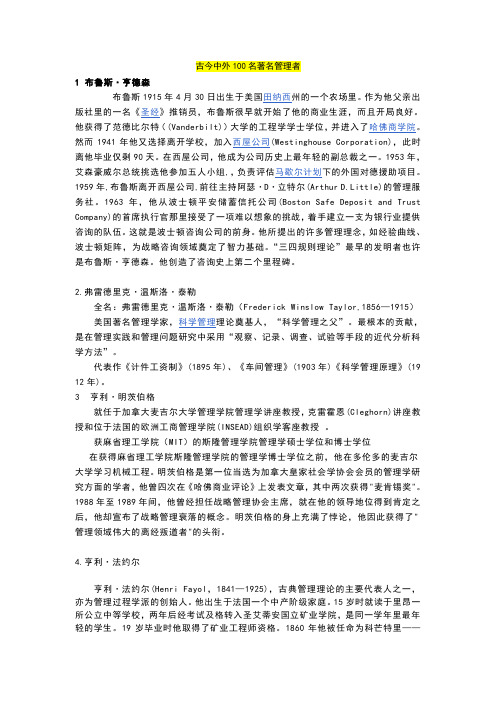
古今中外100名著名管理者1 布鲁斯·亨德森布鲁斯1915年4月30日出生于美国田纳西州的一个农场里。
作为他父亲出版社里的一名《圣经》推销员,布鲁斯很早就开始了他的商业生涯,而且开局良好。
他获得了范德比尔特((Vanderbilt))大学的工程学学士学位,并进入了哈佛商学院。
然而1941年他又选择离开学校,加入西屋公司(Westinghouse Corporation),此时离他毕业仅剩90天。
在西屋公司,他成为公司历史上最年轻的副总裁之一。
1953年,艾森豪威尔总统挑选他参加五人小组,,负责评估马歇尔计划下的外国对德援助项目。
1959年,布鲁斯离开西屋公司,前往主持阿瑟·D·立特尔(Arthur D.Little)的管理服务社。
1963年,他从波士顿平安储蓄信托公司(Boston Safe Deposit and Trust Company)的首席执行官那里接受了一项难以想象的挑战,着手建立一支为银行业提供咨询的队伍。
这就是波士顿咨询公司的前身。
他所提出的许多管理理念,如经验曲线、波士顿矩阵,为战略咨询领域奠定了智力基础。
“三四规则理论”最早的发明者也许是布鲁斯·亨德森。
他创造了咨询史上第二个里程碑。
2.弗雷德里克·温斯洛·泰勒全名:弗雷德里克·温斯洛·泰勒(Frederick Winslow Taylor,1856—1915)美国著名管理学家,科学管理理论奠基人,“科学管理之父”。
最根本的贡献,是在管理实践和管理问题研究中采用“观察、记录、调查、试验等手段的近代分析科学方法”。
代表作《计件工资制》(1895年)、《车间管理》(1903年)《科学管理原理》(19 12年)。
3亨利·明茨伯格就任于加拿大麦吉尔大学管理学院管理学讲座教授,克雷霍恩(Cleghorn)讲座教授和位于法国的欧洲工商管理学院(INSEAD)组织学客座教授。
世界最具影响力的十大管理大师
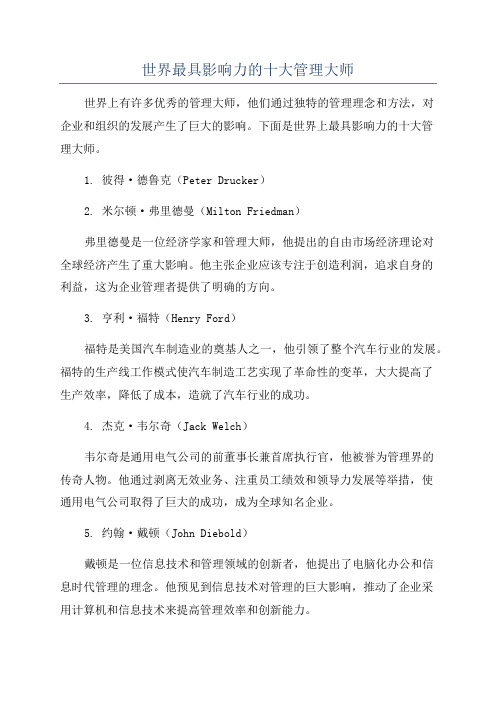
世界最具影响力的十大管理大师世界上有许多优秀的管理大师,他们通过独特的管理理念和方法,对企业和组织的发展产生了巨大的影响。
下面是世界上最具影响力的十大管理大师。
1. 彼得·德鲁克(Peter Drucker)2. 米尔顿·弗里德曼(Milton Friedman)弗里德曼是一位经济学家和管理大师,他提出的自由市场经济理论对全球经济产生了重大影响。
他主张企业应该专注于创造利润,追求自身的利益,这为企业管理者提供了明确的方向。
3. 亨利·福特(Henry Ford)福特是美国汽车制造业的奠基人之一,他引领了整个汽车行业的发展。
福特的生产线工作模式使汽车制造工艺实现了革命性的变革,大大提高了生产效率,降低了成本,造就了汽车行业的成功。
4. 杰克·韦尔奇(Jack Welch)韦尔奇是通用电气公司的前董事长兼首席执行官,他被誉为管理界的传奇人物。
他通过剥离无效业务、注重员工绩效和领导力发展等举措,使通用电气公司取得了巨大的成功,成为全球知名企业。
5. 约翰·戴顿(John Diebold)戴顿是一位信息技术和管理领域的创新者,他提出了电脑化办公和信息时代管理的理念。
他预见到信息技术对管理的巨大影响,推动了企业采用计算机和信息技术来提高管理效率和创新能力。
6. 迪安·库恩茨(Dean Koons)库恩茨是一位管理思想家和学者,他主张以系统思考的方式看待组织和管理。
他的管理理论强调组织内各个部分之间的相互关系和协调,促进组织的整体效能和发展。
7. 杰克·韦尔奇(Howard Gardner)加德纳是一位心智发展和教育领域的权威,他提出了多元智能理论。
他认为人的智能不仅限于智商,还包括许多其他方面,如语言能力、逻辑推理、身体协调等。
他的理论对教育和人才管理产生了深远影响。
8. 莱斯·麦克尼尔(Les McKeown)麦克尼尔是一位企业成长专家,他提出了企业成长的模型。
影响世界进程的位管理学家(Influence of management process of the world)
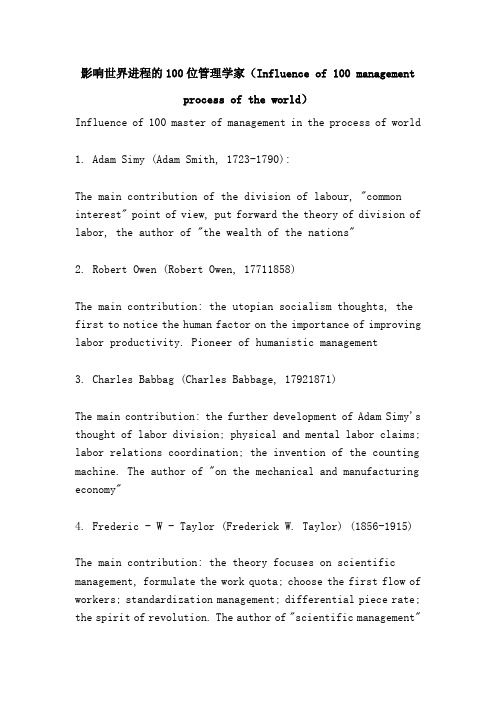
影响世界进程的100位管理学家(Influence of 100 managementprocess of the world)Influence of 100 master of management in the process of world1. Adam Simy (Adam Smith, 1723-1790):The main contribution of the division of labour, "common interest" point of view, put forward the theory of division of labor, the author of "the wealth of the nations"2. Robert Owen (Robert Owen, 17711858)The main contribution: the utopian socialism thoughts, the first to notice the human factor on the importance of improving labor productivity. Pioneer of humanistic management3. Charles Babbag (Charles Babbage, 17921871)The main contribution: the further development of Adam Simy's thought of labor division; physical and mental labor claims; labor relations coordination; the invention of the counting machine. The author of "on the mechanical and manufacturing economy"4. Frederic - W - Taylor (Frederick W. Taylor) (1856-1915)The main contribution: the theory focuses on scientific management, formulate the work quota; choose the first flow of workers; standardization management; differential piece rate; the spirit of revolution. The author of "scientific management"principle.5. Karl Bath (Carl G., Barth, 1860-1939)The main contribution: the implementation of Taylor's Orthodox faithful. The author of "as part of the machinery factory management system" slipstick Taylor6. Henry Gunter (Henry L., Gantt, 1861-1919)The main contribution: the invention of the Gantt chart, author of "the Gantt chart: an effective management tool", "industry leader"7. Frank Gilbreth (Frank B., Gilbreth, 1868-1924)The main contribution is the main contribution of time and motion study, time trajectory photography.8. Lillian Gilbreth (Lillian Moller, Gilbreth, 1878-1972)The main contribution: Gilbreth's wife. Time study and action research9. Harrington Emerson (Harrington Emerson 1853-1931)The main contribution: the efficiency of the high priest, puts forward twelve principles of efficiency, the author of "twelve principles" efficiency10. Maurice Cook (Morris Cooke, 1872-1960)The main contribution is the main contribution in the University and the municipal management11. Henry Fayol (Henry Fayol, 1841-1925)The main contribution: classical organization theory, put forward the principles and functions of management principles, the author of "industrial management and general management" etc..12. Max Webb (Max Weber, 1864-1920)The main contribution: classical organization theory, power theory research; bureaucratic organization mode, the author of "theory of social and economic organization".13. Lindell Urwick (Lyndall F., Urwick, 1891-1984)The main contributions: first president of the International Management Association; comprehensive study of classical management theory, the greatest contribution to the classical theory of comprehensive. Put forward the eight principles of the organization, the author of "administrative principle", "management elements"14. Luther Gulik (Luther H., Gulick, 1892-1993)The main contribution: classical management theory, put forward the seven functions of management, the author of "management" in scientific papers15. Mary Parker Follet (Mary Parker Follett, 1868l933)The main contribution of the transition period, the bridge of classical management theory and behavior science theory, mainly concentrated in the thought of administrative management, proposed the integration of shared responsibility, author of "dynamic administration" etc..16. Hugo Mtinsterberg (Hugo Munsterberg, 1863 l9l6)The main contribution: the transition period, one of the founders of industrial psychology.17. George Elton Meo (George Elton, Mayo, 1880-1949)The main contribution of Hawthorne experiment, interpersonal relationship theory. The author of "industrial civilization", "human problem of industrial civilization of social problems"18. Fritz Roth (Fritz J. Roethlisberger, Berg, 1898-1974)The main contribution: the theory emphasizes the interpersonal relationship, and Mayo cooperation 20 years.19. Herbert Simon (Herbert A. Simon)The main contribution of the decision theories, put forward the theory of decision making. The two series of works with "administrative behavior" and "artificial science". Classic "his management behavior" (1947) is based on the decisionmaking of the management doctoral thesis. He is the winner of the Nobel prize in economics and computer science Turing Award winner.20. Abraham Maslow (Abraham Maslow, 1908l970)The main contribution: American behavioral psychologist, put forward five demand level theory, the author of "motivation and personality", "the spirit of good management" etc..21. Clayton Aldford (Clayton Alderfer)The main contribution: put forward the required levels of ERG needs theory22. David McClelland (David McClelland)The main contribution: put forward the hierarchy of needs theory of achievement motivation23. Douglas Mcgregor (Douglas McGregor, 1906 - 1964)The main contribution: the thinker of human relations, proposed the X-Y theory, the author of "enterprise personnel" etc..24. John Morse (John Morse)The main contribution: put forward the hypothesis of human nature - Y theory, author of "the organization law" and other members: contingency.25. William Aoki (William G. Ouchi)The main contribution of the Z theory of humanity hypothesis, the author of "Z: how American business can meet the Japanese challenge."26. Chris Argiris (Chris Argyris)The main contribution: put forward the hypothesis of human nature is not mature mature theory, the author of "human nature" and organization etc.27. Kurt Lewin (Kurt Lewin, 1890 - 1947)The main contribution: put forward the group behavior theory: "group dynamics" and "informal organization", author of "personality", "dynamic theory in social science field"28. Leland Bradford (Leland Bradford)The main contributions: proposed group behavior: "sensitivity training" - laboratory training29. Skinner (B. F. Skinner)The main contribution: puts forward to strengthen the theoretical correction behavior, author of "the behavior of organisms: an experimental analysis of" science "and" human behavior30. Albert Bandura (Albert Bandura)The main contributions: proposed behavior modification self reinforcement theory31. Lyman Porter (Lyman Porter)The main contribution: put forward a comprehensive incentive model, the author of "management attitude and achievement"32. Victor Virum (Victor H. Vroom)The main contribution: the potency means expectation theory, author of "work and motivation"33. Frederick Hertzberger (Frederick Herzberg)The main contribution: put forward the double factor theory, the author of the "work" of the incentive factors34. Stacy Adams (J. Stacy. Adams)The main contributions: proposed equity theory, author of "workers on wages unfair inner conflict with its productivity", "social exchange relationship in unfair"35. Harold Kelly (Harold H. Kelley)The main contribution: the attribution theory, another expansion and development of Hyde attribution theory. The author of the attribution theory of social psychology "36. Harold Kunz (Harold Koontz, 19081984)The main contribution of signs, the formation of the western modern management theory of the management process school representatives, emphasizes the principle and method of management concept, theory, and the author of "management"37. Chester Barnard (Chester Barnard, 1886-1961)The main contributions: social system school founder, mainly studies the functions of the executive, organization and management, the author of "functional managers"38. Stanley Sishall (Stanley E. Seashore)The main contributions: contemporary economists and social psychologists, put forward "organizational effectiveness evaluation standard"39. head Baum (Robert Tannenbaum)The main contribution: Leadership continuum theory, the author of "how to choose the model of leadership"40. Ohio State University research groupThe main contribution of "leadership structure: put forward the two-dimensional surface theory41. Rensis Likert (Rensis Likert) (Michigan study)The main contributions: Founder support relation theory, put forward four kinds of leadership system, the author of "new management", "human"42. Robert Black (Robert R. Blake)The main contributions: proposed management grid theory, the author of "management"43. Fred Fiedler (Fred E. Fiedler)The main contributions: contingency theory school founder, this type of leadership contingency theory, the author of "the new direction of a contingency model of leadership effectiveness"44. Robert House (Robert J House)The main contributions: proposed contingency leadership theory: path goal theory;Forty-fivePaul Heresy (Paul Hersey)The main contribution of "put forward: Leadership contingency theory: Leadership life cycle theory, the author of" situational leadership "46. Richard Johnson (Richard A. Johnson)The main contributions: system management school is one of the representatives of 1963, with Custer, Rosenzweig co wrote "system theory and management"47. Fremont Kast (Fremont E. Kast)The main contributions: system management school is one of the representatives, in cooperation with Rosenzweig in 1970 published "the organization and management of a system of doctrine" comprehensively elaborated the system management theory. Custer put forward 6 steps: mode of organizational change,48. James Rosenzweig (James E. Rosenzweig)The main contributions: system management school is one of the representatives of 1963, with Johnson, Custer three people wrote "system theory and management", in cooperation with Custer in 1970 published "the organization and management of a system of doctrine" comprehensively elaborated the system management theory.49. James Grier Miller (James Grier Miller)The main contributions: one of the main representatives of the school of system management characters50. Mesa Boris (M. Mesarovie)The main contributions: one of the main representatives of the school of system management characters51. Peter Drucker (Peter Drucker)The main contribution: the representative of the school of empiricism, American management experts and management consultants, is considered one of the biggest influence on Contemporary Western managerialists. Breakthrough thinking is a process from target management to the management of knowledge workers, the author of "the practice of management", "management: tasks, responsibilities and practices".52. Ernest Dale (Ernest Dale)The main contribution: the representative of the school of empiricism, the main contribution is management experience research, author of "the great organizer", "enterprise management theory and practice"53. William Newman (William Newman)The main contribution: the representative of the school of empiricism, the American management expert, author of "economic management activities: organization and management of technology", "process management",54. Alfred - P - Sloan (Alfred P.Sloan)The main contribution: the representative of the school of empiricism, the American senior manager, longtime GM chairman and general manager of first division organization structure. "I wrote in GM's"55. Paul Lawrence (Paul R. Lawrence)The main contributions: contingency theory representative of the school, the author of "complex tissue differentiation and integration", "organization and environment"56. Fred Luthans (Fred Luthars)The main contribution: the representative of the school of contingency theory, systematically introduces the contingency management theory, put forward the unified management theories with contingency theory. Author of "Introduction to management: a contingency theory"57. Joan Woodward (UK, Joan Woodward)The main contributions: contingency theory representative, British female management experts. The organization design of contingency theory is one of the representatives of the main author, "management and technology", "industrial organization: Theory and practice", "industrial organization: behavior and control",58. Henry Munzberg (Henry Mintzberg)The main contribution: the main representative of the western management science manager role school characters, main contribution lies in the analysis of the manager's job, author of "manager" nature.59. Elwood Spencer Bafa (Elwood Spencer Buffa)The main contribution: the famous scholars of modern production management methods and management science, western scientific management representative. Four types of decision making. Based on author "production management"60.W Edwards Deming (W. Edwards Deming)The main contribution is: "quality management and quality management in fourteen, effective guidance of Toyota Auto Body Co management. The author of "out of the crisis".61. Joseph Juran (Joseph Juran)The main contribution: put forward the comprehensive quality management theory, quality of three yuan, the introduction of quality management principles of 80/20, the author of "quality control handbook", "Juran" and so on the quality of leadership62. Dale Carnegie (Dale Carnegie)The main contribution: the breakthrough idea is: marketing, communication and guidance problem. The author of "how to win friends and influence people" etc..63. James Champy (James Champy)The main contribution: breakthrough ideas for the business reconstruction thought was put forward, and the BPR (Business Process Reengineering), the author of "re creation"enterprises rethink fundamental and thorough reform on the working process.64. Marvin Bauer (Marvin Bower)The main contribution: the father of modern management consulting, a management consulting industry, created the legend of McKinsey & company, the main theory is the professional field of corporate culture and value, team work and project management, management consultant. The author of "management", "leadership" will will.65. Kenichi Ohmae (Kenichi Ohmae)The main contribution: Japan's strategic father, is the entrepreneur's strategic mind, put forward the strategy and the key success factors, is the author of more than 40. The author of the mind of the strategist "world without borders", ".66. Tom Peters (Tom Peters)The main contribution: put forward is the only way for enterprises to survive. The author of "the pursuit of excellence" opened up a business book topped the bestseller list the first "management revolution"67. Bruce Henderson (Bruce Henderson)The main contribution: the establishment of the first pure strategy consultants: Boston consulting firm, proposed the Boston matrix.68. Henry Ford (Henry Ford)The main contributions: the United States Ford's founder, major breakthrough thought is mass production, author of "my life and work".69. small Thomas Watson (Thomas Watson Jr.)The main contribution: IBM (IBM) former chairman of the company, discusses the tenet, "the author of a business and its beliefs".70. David Packard (David Packard)The main contribution: the Hewlett-Packard Co's founder of HP, author of "Tao"71. Akio Morita (Akito Morita)The main contributions: one of the founder of Sony Corp in Japan, breakthrough thought mainly in "Japanese management", the author of "made in Japan".72. Konosuke Matsushita (Konosuke Matsushita)The main contributions are: Matsushita co-founder of Panasonic Corp. The implementation of dam operation. The breakthrough idea is customer service, entrepreneurial talent, the author not only for "bread".73. Robert Townsend (Robert Townsend)The main contribution: President of American Express Company for 13 years, reveals the modern organization of bloated, stupid and ridiculous, author of "promote the organization"74. Harold Jelin (Harold Geneen)The main contributions: ITT (ITT) president, company bought a total of 350, including AI, for car rental companies, Sheraton Hotels, breakthrough ideas for fact analysis and management, the author of "synergy" and other myths.75. Igor Ansoff (Igor Ansoff)The main contribution is one of the key figures of the system described, a clear idea of strategic management, the main achievement is the analysis of the strategic management theory and gap and synergy theory, author of "company strategy".76. Michael Porter (Michael Porter)The main contribution: the world's highest authority on competitive strategy. Put forward five kinds of power industry competition, three basic competitive strategy, competitive analysis of four kinds of elements and far-reaching insights. The author of "competitive strategy", "competitive advantage", "national competitiveness".77. Gary Hamel (Gary Hamel)The main contribution: put forward the theory of corecompetence "is a representative of corporate strategy in 90s. The author of "the core competence of the corporation" etc..78. Richard Pascal (RiChard Pascale)The main contribution of the 7S structure, provides a method for comparison of American and Japanese management. Author: "Japanese enterprise management", "art difficult management"79. Rosa Beth Moss Kanter (Rosabeth Moss Kanter)The main contribution: the creation of a good scale consultancy, research strategy, innovation and reform, put forward the "authorized" concept, the author of "dance", when the giant change "master" etc..80. Charles Handy (Charles Handy)The main contribution: put forward three kinds of new forms of organization: Shamrock organization, federal organization, 3I. The author of "understanding the organization", "irrational time" and "empty raincoat" etc..81. Alfred Chandler (Alfred Chandler)The main contribution: the relationship between the main strategy and structure of multi divisional business problems, the author of "strategy and structure" etc..82. Sumantra Ghoshal (Sumantra Ghoshal)The main contribution of India scholars, put forward the globalization and corporate structure thought, put forward the concept of personalized company, author of "personalized", etc..83. Peter Senge (Peter Senge)The main contributions: Massachusetts Institute of Technology Center for learning organization. The biggest contribution is to put forward the concept of "learning organization" and its essence. The author of "the fifth discipline" etc..84. Geert Hofstede (Geert Hofstede)The main contributions: Holland psychologist, breakthrough ideas for cultural management, the author of "the importance of culture".85. Fons Chupannas (Fons Trompenaars)The main contribution of various cultural factors: Discussion of management may be encountered in the process of economic globalization is how to influence people's action, conflict lists several cultures, author of "cross cultural tide" etc..86. Edgar Schein (Edgar Schein)The main contributions: one of the founder organizations in the field of psychology, put forward the concept of "enterprise culture", paved the way for future research on enterprise culture. The author of "organizational culture and leadership","organizational psychology" etc..87. Elliot Jacques (Elliott Jaques)The main contribution: the Canadian psychologist, put forward the management level of enterprises should be based on the cost leadership before the decision can be measured and the length of time should be according to the length of time the reward. The author of "enterprise culture change", "time of freedom"88. Alvin Toffler (Alvin Toffler)The main contribution: American futurist contributions divided humanity three period. The author of "future shock", "the third wave"89. John Naisbitt (John Naisitt)The main contributions: future science authority figures, discusses the structural reform in ten aspects, the author of "big trend" the book sold 8 million copies.90. Mary Parker Folett (Mary Parker Follett)The main contribution of proposed management training and education leaders to accept the view, pointed out three ways to deal with conflict.91. Warren Bennis (Warren Bennis)The main contributions: Pioneer organization developmenttheory, a breakthrough is the development of organization theory, discusses the dynamics under the framework of leadership in the organization. The author of "strategy", the leader in charge: "genius" and other organizations.92. Lawrence Peter (Laurence Peter)The main contribution: the focus of the study focused on enterprise level and management system, the core is the "Peter principle". The author of the "Peter principle"93. Theodore Levitt (Theodore Levitt)The main contribution: Fellow of the American Institute of marketing master major in recent thirty years. Pointed out,。
影响世界的100条管理名言

影响世界的100条管理名言1、企业即人——日本经营之神松下幸之助2、企业最大的资产是人——日本经营之神松下幸之助3、用人不在于如何减少人的短处,而在于如何发挥人的长处——著名管理学家彼得·杜拉克4、卓有成效的管理者善于用人之长——著名管理学家彼得·杜拉克5、造人先于造物——日本经营之神松下幸之助6、员工培训是企业风险最小,收益最大的战略性投资——著名的企业管理学教授沃伦·贝尼斯7、千方百计请一个高招的专家医生,还不如请一个随叫随到且价格便宜的江湖郎中——管理学者詹姆斯·柯林斯8、一个公司要发展迅速得力于聘用好的人才,尤其是需要聪明的人才——世界首富比尔·盖茨9、把我们顶尖的20个人才挖走,那么我告诉你,微软会变成一家无足轻重的公司——世界首富比尔·盖茨10、将合适的人请上车,不合适的人请下车——管理学者詹姆斯·柯林斯11、人才是利润最高的商品,能够经营好人才的企业才是最终的大赢家——联想集团总裁柳传志12、质量是维护顾客忠诚的最好保证——通用电器公司总裁杰克·韦尔奇13、20世纪是生产率的世纪,21世纪是质量的世纪——美国著名质量管理学家约瑟夫·朱兰博士14、对产品质量来说,不是100分就是0分——日本经营之神松下幸之助15、全世界没一个质量差、光靠价格便宜的产品能够长久地存活下来——华硕总经理徐世明16、质量等于利润——管理思想家汤姆·彼得斯17、将良品率预定为85%,那么便表示容许15%的错误存在——质量管理大师菲利普·克劳斯18、产品质量是生产出来的,不是检验出来的——美国质量管理大师威廉·戴明博士19、企业的成功靠团队,而不是靠个人——管理大师罗伯特·凯利20、合作是一切团队繁荣的根本——美国自由党领袖大卫·史提尔21、最好的CEO是构建他们的团队来达成梦想,即便是迈克尔·乔丹也需要队友来一起打比赛——通用电话电子公司董事长查尔斯·李22、大成功靠团队,小成功靠个人——世界首富比尔·盖茨23、不创新,就灭亡——福特公司创始人亨利·福特24、可持续竞争的惟一优势来自于超过竞争对手的创新能力——著名管理顾问詹姆斯·莫尔斯25、创新是做大公司的惟一之路——管理大师杰弗里26、顾客是重要的创新来源——管理学家汤姆·彼得斯27、创新是惟一的出路,淘汰自己,否则竞争将淘汰我们——英特尔公司总裁安迪·格罗夫28、创造性模仿不是人云亦云,而是超越和再创造——哈佛大学教授西奥多·莱维特29、创新就是创造一种资源——管理大师彼得·杜拉克30、管理就是沟通、沟通再沟通——通用电器公司总裁杰克·韦尔奇31、沟通是管理的浓缩——沃尔玛公司总裁萨姆·沃尔顿32、管理者的最基本能力:有效沟通——英国管理学家L·威尔德33、不善于倾听不同的声音,是管理者最大的疏忽——美国女企业家玛丽·凯34、企业管理过去是沟通,现在是沟通,未来还是沟通——日本经营之神松下幸之助35、管理就是决策——美国著名管理学家赫伯特·西蒙36、世界上每100家破产倒闭的大企业中,85%是因为企业管理者的决策不慎造成的——世界著名的咨询公司——美国兰德公司37、正确的决策来自众人的智慧——美国社会学家T·戴伊38、一个成功的决策,等于90%的信息加上10%的直觉——美国企业家S·M·沃尔森39、犹豫不决固然可以免去一些做错事的可能,但也失去了成功的机会——美籍华裔企业家王安博士40、在没出现不同意见之前,不做出任何决策——美国通用汽车公司总裁艾尔弗雷德·斯隆41、不要把所有的鸡蛋放在同一个篮子里——美国经济学家托宾42、一次良好的撤退,应和一次伟大的胜利一样受到奖赏——瑞士军事理论家菲米尼43、抓住时机并快速决策是现代企业成功的关键——美斯坦大学教授艾森哈特44、决不能在没有选择的情况下,作出重大决策——美国克莱斯勒汽车公司总裁李·柯卡45、如果有一个项目,首先要考虑有没有人来做。
古今中外100名著名管理者
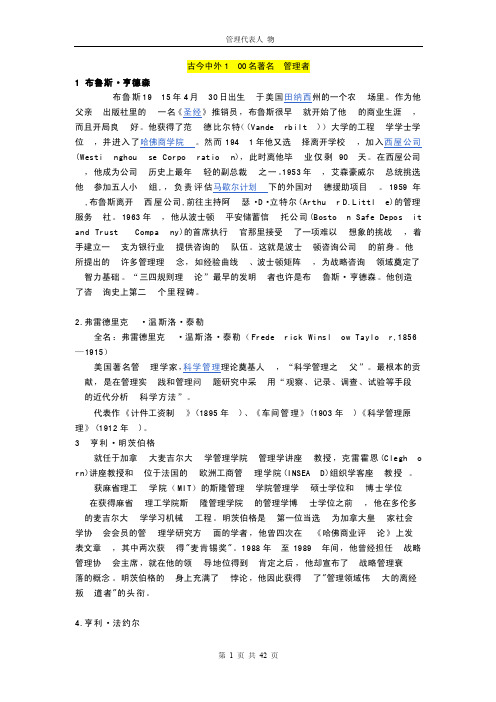
古今中外100名著名管理者1 布鲁斯·亨德森布鲁斯1915年4月30日出生于美国田纳西州的一个农场里。
作为他父亲出版社里的一名《圣经》推销员,布鲁斯很早就开始了他的商业生涯,而且开局良好。
他获得了范德比尔特((Vanderbilt))大学的工程学学士学位,并进入了哈佛商学院。
然而1941年他又选择离开学校,加入西屋公司(Westinghouse Corporation),此时离他毕业仅剩90天。
在西屋公司,他成为公司历史上最年轻的副总裁之一。
1953年,艾森豪威尔总统挑选他参加五人小组,,负责评估马歇尔计划下的外国对德援助项目。
1959年,布鲁斯离开西屋公司,前往主持阿瑟·D·立特尔(Arthur D.Little)的管理服务社。
1963年,他从波士顿平安储蓄信托公司(Boston Safe Deposit and TrustCompany)的首席执行官那里接受了一项难以想象的挑战,着手建立一支为银行业提供咨询的队伍。
这就是波士顿咨询公司的前身。
他所提出的许多管理理念,如经验曲线、波士顿矩阵,为战略咨询领域奠定了智力基础。
“三四规则理论”最早的发明者也许是布鲁斯·亨德森。
他创造了咨询史上第二个里程碑。
2.弗雷德里克·温斯洛·泰勒全名:弗雷德里克·温斯洛·泰勒(Frederick Winslow Taylor,1856—1915)美国著名管理学家,科学管理理论奠基人,“科学管理之父”。
最根本的贡献,是在管理实践和管理问题研究中采用“观察、记录、调查、试验等手段的近代分析科学方法”。
代表作《计件工资制》(1895年)、《车间管理》(1903年)《科学管理原理》(1912年)。
影响世界的100条管理名言
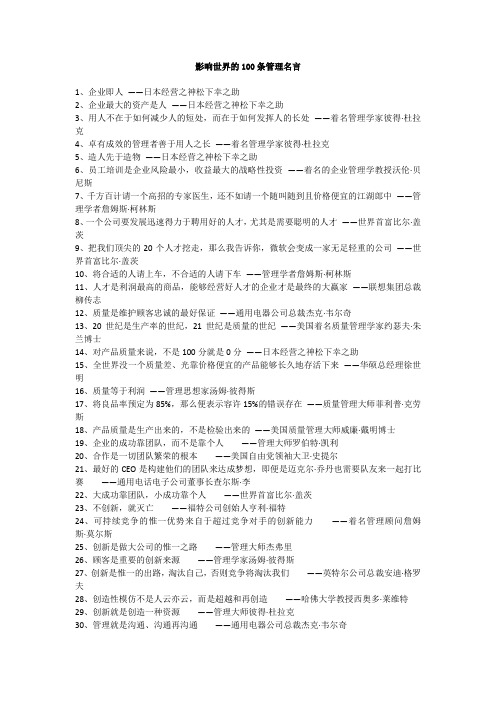
影响世界的100条管理名言1、企业即人——日本经营之神松下幸之助2、企业最大的资产是人——日本经营之神松下幸之助3、用人不在于如何减少人的短处,而在于如何发挥人的长处——着名管理学家彼得·杜拉克4、卓有成效的管理者善于用人之长——着名管理学家彼得·杜拉克5、造人先于造物——日本经营之神松下幸之助6、员工培训是企业风险最小,收益最大的战略性投资——着名的企业管理学教授沃伦·贝尼斯7、千方百计请一个高招的专家医生,还不如请一个随叫随到且价格便宜的江湖郎中——管理学者詹姆斯·柯林斯8、一个公司要发展迅速得力于聘用好的人才,尤其是需要聪明的人才——世界首富比尔·盖茨9、把我们顶尖的20个人才挖走,那么我告诉你,微软会变成一家无足轻重的公司——世界首富比尔·盖茨10、将合适的人请上车,不合适的人请下车——管理学者詹姆斯·柯林斯11、人才是利润最高的商品,能够经营好人才的企业才是最终的大赢家——联想集团总裁柳传志12、质量是维护顾客忠诚的最好保证——通用电器公司总裁杰克·韦尔奇13、20世纪是生产率的世纪,21世纪是质量的世纪——美国着名质量管理学家约瑟夫·朱兰博士14、对产品质量来说,不是100分就是0分——日本经营之神松下幸之助15、全世界没一个质量差、光靠价格便宜的产品能够长久地存活下来——华硕总经理徐世明16、质量等于利润——管理思想家汤姆·彼得斯17、将良品率预定为85%,那么便表示容许15%的错误存在——质量管理大师菲利普·克劳斯18、产品质量是生产出来的,不是检验出来的——美国质量管理大师威廉·戴明博士19、企业的成功靠团队,而不是靠个人——管理大师罗伯特·凯利20、合作是一切团队繁荣的根本——美国自由党领袖大卫·史提尔21、最好的CEO是构建他们的团队来达成梦想,即便是迈克尔·乔丹也需要队友来一起打比赛——通用电话电子公司董事长查尔斯·李22、大成功靠团队,小成功靠个人——世界首富比尔·盖茨23、不创新,就灭亡——福特公司创始人亨利·福特24、可持续竞争的惟一优势来自于超过竞争对手的创新能力——着名管理顾问詹姆斯·莫尔斯25、创新是做大公司的惟一之路——管理大师杰弗里26、顾客是重要的创新来源——管理学家汤姆·彼得斯27、创新是惟一的出路,淘汰自己,否则竞争将淘汰我们——英特尔公司总裁安迪·格罗夫28、创造性模仿不是人云亦云,而是超越和再创造——哈佛大学教授西奥多·莱维特29、创新就是创造一种资源——管理大师彼得·杜拉克30、管理就是沟通、沟通再沟通——通用电器公司总裁杰克·韦尔奇31、沟通是管理的浓缩——沃尔玛公司总裁萨姆·沃尔顿32、管理者的最基本能力:有效沟通——英国管理学家L·威尔德33、不善于倾听不同的声音,是管理者最大的疏忽——美国女企业家玛丽·凯34、企业管理过去是沟通,现在是沟通,未来还是沟通——日本经营之神松下幸之助35、管理就是决策——美国着名管理学家赫伯特·西蒙36、世界上每100家破产倒闭的大企业中,85%是因为企业管理者的决策不慎造成的——世界着名的咨询公司——美国兰德公司37、正确的决策来自众人的智慧——美国社会学家T·戴伊38、一个成功的决策,等于90%的信息加上10%的直觉——美国企业家S·M·沃尔森39、犹豫不决固然可以免去一些做错事的可能,但也失去了成功的机会——美籍华裔企业家王安博士40、在没出现不同意见之前,不做出任何决策——美国通用汽车公司总裁艾尔弗雷德·斯隆41、不要把所有的鸡蛋放在同一个篮子里——美国经济学家托宾42、一次良好的撤退,应和一次伟大的胜利一样受到奖赏——瑞士军事理论家菲米尼43、抓住时机并快速决策是现代企业成功的关键——美斯坦大学教授艾森哈特44、决不能在没有选择的情况下,作出重大决策——美国克莱斯勒汽车公司总裁李·柯卡45、如果有一个项目,首先要考虑有没有人来做。
世界十大管理学家
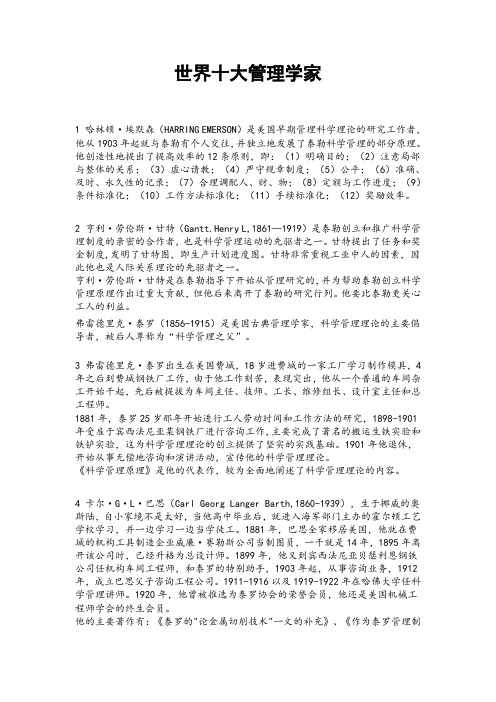
世界十大管理学家1 哈林顿·埃默森(HARRING EMERSON)是美国早期管理科学理论的研究工作者,他从1903年起就与泰勒有个人交往,并独立地发展了泰勒科学管理的部分原理。
他创造性地提出了提高效率的12条原则,即:(1)明确目的;(2)注意局部与整体的关系;(3)虚心请教;(4)严守规章制度;(5)公平;(6)准确、及时、永久性的记录;(7)合理调配人、财、物;(8)定额与工作进度;(9)条件标准化;(10)工作方法标准化;(11)手续标准化;(12)奖励效率。
2 亨利·劳伦斯·甘特(Gantt.Henry L,1861—1919)是泰勒创立和推广科学管理制度的亲密的合作者,也是科学管理运动的先驱者之一。
甘特提出了任务和奖金制度,发明了甘特图,即生产计划进度图。
甘特非常重视工业中人的因素,因此他也是人际关系理论的先驱者之一。
亨利·劳伦斯·甘特是在泰勒指导下开始从管理研究的,并为帮助泰勒创立科学管理原理作出过重大贡献,但他后来离开了泰勒的研究行列。
他要比泰勒更关心工人的利益。
弗雷德里克·泰罗(1856-1915)是美国古典管理学家,科学管理理论的主要倡导者,被后人尊称为“科学管理之父”。
3 弗雷德里克·泰罗出生在美国费城,18岁进费城的一家工厂学习制作模具,4年之后到费城钢铁厂工作,由于他工作刻苦,表现突出,他从一个普通的车间杂工开始干起,先后被提拔为车间主任、技师、工长、维修组长、设计室主任和总工程师。
1881年,泰罗25岁那年开始进行工人劳动时间和工作方法的研究,1898-1901年受雇于宾西法尼亚某钢铁厂进行咨询工作,主要完成了著名的搬运生铁实验和铁铲实验,这为科学管理理论的创立提供了坚实的实践基础。
1901年他退休,开始从事无偿地咨询和演讲活动,宣传他的科学管理理论。
《科学管理原理》是他的代表作,较为全面地阐述了科学管理理论的内容。
- 1、下载文档前请自行甄别文档内容的完整性,平台不提供额外的编辑、内容补充、找答案等附加服务。
- 2、"仅部分预览"的文档,不可在线预览部分如存在完整性等问题,可反馈申请退款(可完整预览的文档不适用该条件!)。
- 3、如文档侵犯您的权益,请联系客服反馈,我们会尽快为您处理(人工客服工作时间:9:00-18:30)。
影响世界进程的100位管理大师1.亚当·斯密(Adam Smith,1723-1790):主要贡献:劳动分工、“共同利益”的观点,提出分工理论,著有《国富论》2.罗伯特·欧文(Robert Owen,1771-1858)主要贡献:提出空想社会主义的思想、最早注意到人的因素对提高劳动生产率的重要性。
人本管理的先驱3.查尔斯·巴贝奇(Charles Babbage,1792-1871)主要贡献:进一步发展了亚当·斯密的劳动分工思想;体力和脑力劳动分工主张;劳资关系协调;发明计数机器。
著有《论机械和制造业的经济》4.弗雷德里克·W·泰勒(Frederick W. Taylor)(1856-1915)主要贡献:理论集中在科学管理方面,制订工作定额;选择第一流工人;标准化管理;差别计件工资;精神革命。
著有《科学管理原理》等。
5.卡尔·巴思(Carl G. Barth,1860-1939)主要贡献:执行泰勒制的正统的忠实信徒。
著有《作为泰罗管理制度一部分的机械厂计算尺》6.亨利·甘特(Henry L. Gantt,1861-1919)主要贡献:发明了甘特图,著有《甘特图表:管理的一个行之有效的工具》、《工业领导》7.弗兰克·吉尔布雷斯(Frank B. Gilbreth,1868-1924)主要贡献:主要贡献是时间和动作研究、计时轨迹摄影技术。
8.莉莲·吉尔布雷斯(Lillian Moller Gilbreth,1878-1972)主要贡献:吉尔布雷斯的妻子。
时间研究和动作研究9.哈林顿·埃默森(Harrington Emerson,1853-1931)主要贡献:效率的大祭司,提出效率的十二个原则,著有《十二个效率原则》10.莫里斯·库克(Morris Cooke,1872-1960)主要贡献:主要贡献是在大学和市政管理方面11.亨利·法约尔(Henry Fayol,1841-1925)主要贡献:古典组织理论,提出了职能原则和管理原则,著有《工业管理与一般管理》等。
12.马克斯·韦伯(Max Weber,1864-1920)主要贡献:古典组织理论,权力论;研究组织的官僚模式,著有《社会与经济组织理论》。
13.林德尔·厄威克(Lyndall F. Urwick,1891-1984)主要贡献:国际管理协会的首任会长;研究综合古典管理理论,最大的贡献是对经典的管理理论进行了综合。
提出了组织的八项原则,著有《行政管理原理》、《管理的要素》14.卢瑟·古利克(Luther H. Gulick,1892-1993)主要贡献:综合古典管理理论,提出管理的七项职能说,著有《管理科学论文集》15.玛丽·帕克·福莱特(Mary Parker Follett,1868-l933)主要贡献:过渡期,架起古典管理理论和行为科学理论的桥梁,主要思想集中在行政管理,提出整合与责任分担问题,著有《动态的行政管理》等。
16.雨果·孟斯特伯格(Hugo Munsterberg,1863-l9l6)主要贡献:过渡期,工业心理学的创始人之一。
17.乔治·埃尔顿·梅奥(George Elton Mayo,1880-1949)主要贡献:在第二阶段参与霍桑实验,提出人际关系理论。
著有《工业文明的人类问题》、《工业文明的社会问题》18.弗里茨·罗特利斯伯格(Fritz J. Roethlisberger,1898-1974)主要贡献:突出人际关系理论,与梅奥合作20余年。
19.赫伯特·西蒙(Herbert A. Simon)主要贡献:决策理论学派,提出了决策理论。
著有《行政管理行为》和《人工科学》两个系列论著。
他的经典著作《管理行为》(1947)的基础是其关于管理决策制定的博士论文。
他既是诺贝尔经济学奖的得主又是计算机科学图灵奖的得主。
20.亚伯拉罕·马斯洛(Abraham Maslow,1908-l970)主要贡献:美国行为心理学家,提出需求五层次理论,著有《激励与个性》、《良好精神管理》等。
21.克莱顿·阿尔德佛(Clayton Alderfer)主要贡献:提出需要层次的ERG需要理论22.戴维·麦克利兰(David McClelland)主要贡献:提出需要层次的成就动机理论23.道格拉斯·麦克雷戈(Douglas McGregor,1906-1964年)主要贡献:人际关系学方面的思想家,提出X-Y理论,著有《企业的人事方面》等。
24.约翰·莫尔斯(John Morse)主要贡献:提出人性假设的超Y理论,著有《组织及其他成员:权变法》。
25.威廉·奥奇(William G. Ouchi)主要贡献:提出人性假设的Z理论,著有《Z理论——美国企业界怎样迎接日本的挑战》26.克里斯·阿基里斯(Chris Argyris)主要贡献:提出人性假设的不成熟-成熟理论,著有《人性与组织》等27.库尔特·卢因(Kurt Lewin,1890 - 1947)主要贡献:提出团体行为理论:“团体力学”和“非正式组织”,著有《人格的动力理论》、《社会科学中的场论》28.利兰·布雷德福(Leland Bradford)主要贡献:提出群体行为:“感受性训练”- 实验室训练29.斯金纳(B. F. Skinner)主要贡献:提出行为修正的强化理论,著有《有机体的行为:一种实验的分析》《科学与人类行为》30.阿尔伯特·班杜拉(Albert Bandura)主要贡献:提出行为修正的自我强化理论31.莱曼·波特(Lyman Porter)主要贡献:提出综合激励模型,著有《管理态度和成绩》32.维克多·维鲁姆(Victor H. Vroom)主要贡献:提出效价-手段-期望理论,著有《工作与动机》33.弗雷德里克·赫茨伯格(Frederick Herzberg)主要贡献:提出双因素理论,著有《工作的激励因素》34.斯塔西·亚当斯(J. Stacy. Adams)主要贡献:提出公平理论,著有《工人关于工资不公平的内心冲突同其生产率的关系》、《社会交换中的不公平》35.哈罗德·凯利(Harold H. Kelley)主要贡献:提出归因理论,对海德的归因理论进行又一次扩充和发展。
著有社会心理学的归因理论》36.哈罗德·孔茨(Harold koontz,1908-1984)主要贡献:西方现代管理理论形成的标志、管理过程学派代表、强调管理的概念、理论、原理和方法,著有《管理学》37.切斯特·巴纳德(Chester Barnard,1886-1961)主要贡献:社会系统学派创始人、主要研究经理人员的职能、组织与管理,著有《经理人员的职能》38.斯坦利·西肖尔(Stanley E. Seashore)主要贡献:当代经济学家和社会心理学家,提出“组织有效性评价标准”39.坦南鲍姆(Robert Tannenbaum)主要贡献:领导连续体理论,著有《如何选择领导模式》40.俄亥俄州立大学研究小组主要贡献’:提出领导行为的二维构面理论41.伦西斯·利克特(Rensis Likert)(密执安研究)主要贡献:支持关系理论的创始人,提出四种领导体制,著有《新型的管理》、《人类组织》42.罗伯特·布莱克(Robert R. Blake)主要贡献:提出管理方格理论,著有《管理方格》43.弗雷德·菲德勒(Fred E. Fiedler)主要贡献:权变理论学派创始人,提出领导类型权变理论,著有《权变模型一领导效用的新方向》44.罗伯特·豪斯(Robert J House)主要贡献:提出领导权变理论:途径-目标理论;45.保罗·赫塞(Paul Hersey)主要贡献’:提出领导行为权变理论:领导生命周期理论,著有《情境领导》46.理查德·约翰逊(Richard A. Johnson)主要贡献:系统管理学派代表人物之一,1963年与卡斯特、罗森茨韦克合写《系统理论和管理》47.弗里蒙特·卡斯特(Fremont E. Kast)主要贡献:系统管理学派代表人物之一,1970年与罗森茨韦克合作发表的《组织与管理—一种系统学说》比较全面地论述了系统管理理论。
提出卡斯特模式:组织变革的6个步骤,48.詹姆斯·罗森茨韦克(James E. Rosenzweig)主要贡献:系统管理学派代表人物之一,1963年与约翰逊、卡斯特三人合写《系统理论和管理》、1970年与卡斯特合作发表的《组织与管理—一种系统学说》比较全面地论述了系统管理理论。
49.詹姆斯·格黑尔·米勒(James Grier Miller)主要贡献:系统管理学派主要代表人物之一50.梅萨·罗维奇(M. Mesarovie)主要贡献:系统管理学派主要代表人物之一51.彼得·德鲁克(Peter Drucker)主要贡献:经验主义学派代表人物,美国管理学家和管理咨询人员,被认为是当代西方影响最大的管理学家之一。
突破思想是从目标管理到管理知识工人的过程,著有《管理的实践》、《管理:任务、责任和实践》等。
52.欧内斯特·戴尔(Ernest Dale)主要贡献:经验主义学派代表人物,主要贡献是比较管理经验研究,著有《伟大的组织者》、《企业管理的理论与实践》53.威廉·纽曼(William Newman)主要贡献:经验主义学派代表人物,美国管理学家,著有《经济管理活动:组织和管理的技术》、《管理的过程》、54.阿尔弗雷德·P·斯隆(Alfred P.Sloan)主要贡献:经验主义学派代表人物,美国高级经理、长期担任通用汽车公司的总经理董事长、首创事业部制组织结构。
著有《我在通用汽车公司的年代》55.保罗·劳伦斯(Paul R. Lawrence)主要贡献:权变理论学派代表人物,著有《复杂组织的分化和整体化》、《组织和环境》56.弗雷德·卢桑斯(Fred Luthars)主要贡献:权变理论学派代表人物,系统地介绍了权变管理理论,提出了用权变理论可以统一各种管理理论的观点。
著有《管理导论:一种权变学说》57.琼·伍德沃德(英国,Joan Woodward)主要贡献:权变理论学派代表人物,英国女管理学家。
